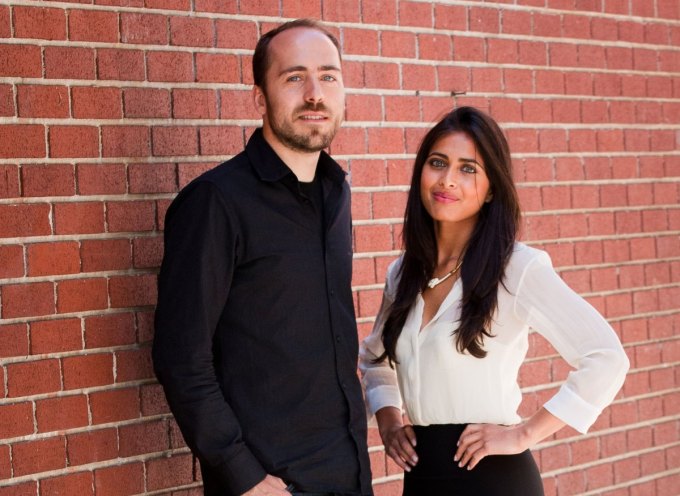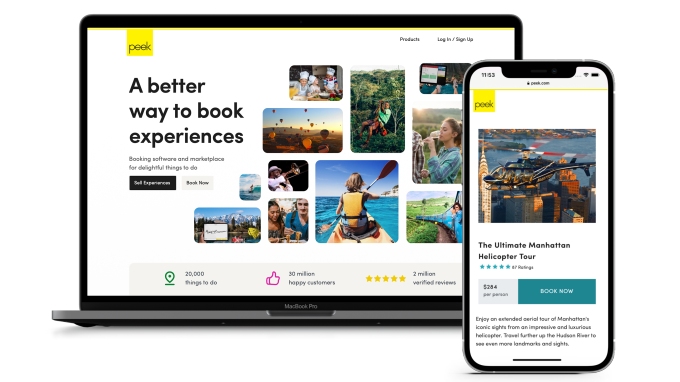Travel and tourism are slowly starting to move again in the wake of Covid-19 crashing over the world and sending us to shelter in place. Today a company focused on experiences — museum visits, skydiving, local cooking classes and more — is announcing a round of growth funding on the back of seeing its own business bounce back. Peek, which provides both a marketplace for consumers to discover and book experiences, a platform for businesses to book team building and other internal events, and tech for tourism companies to digitize, manage and run their own experience businesses online — “like a Shopify for experiences,” CEO and co-founder Ruzwana Bashir said — has raised $80 million. It plans to use the funds to continue expanding its product, hiring more talent, and taking Peek to more places, after passing some $2 billion in bookings from some 35 million customers, mostly in North America.
The round, a Series C, is notable in part because of who is behind it: the funding is being led by WestCap — the investment firm founded by another major player in the business of travel, the former CFO of Airbnb, Laurence Tosi. New investor Goldman Sachs Asset Management is also in the round, along with 3L, Cathay Innovation, I2BF Global Ventures, Manta Ray and Apeiron. Other high profile past backers include Jack Dorsey, Eric Schmidt, and Kayak founder Paul English.
San Francisco-based Peek is not disclosing its valuation, but Bashir told us the figure “has increased substantially because we grew the business a lot and hit profitability this year.” Peek has now raised over $100 million in the last 10 years.
“Now that we are starting to invest again, we are going into investment mode,” she added. Worth pointing out, too, that this round was originally pitched to me as a $60 million investment, and then it grew by $20 million just days ago, which speaks also to the confidence investors currently have in the travel and tourism space.
That’s a big shift from a year ago, when travel-related companies were regrouping and trying to figure out how to continue weathering what had turned out to be a very long storm. Many of them had gone into the summer of 2020 hopeful that the pandemic (which really kicked off earlier in the year) would have subsided and led to a wave of exuberant movement in the warmer months, only to find any bounce short-lived. One of the more well-capitalized of the travel experience startups — Berlin’s GetYourGuide, valued at over $1 billion just 6 months before Covid-19 first started appearing — found itself raising first a big convertible note, and then a big credit facility, as it shored up its business as the pandemic wore on.
Peek was also not immune. When Covid-19 hit, “it was pretty terrifying for us. We were growing great and then, all of the sudden, bookings crashed,” Bashir, who co-founded the company with Oskar Bruening (pictured, below) said. “We then did all the hard things.” That included Peek laying off 30% of its staff to help it get through the slump.
 Peek also took to the offensive, thinking of how it could work differently with its customers on both sides of the business. With end users, it doubled down on virtual experiences (for example, online cooking classes); and rethinking and expanding who “customers” could be by building out experiences booking for corporate and internal events.
Peek also took to the offensive, thinking of how it could work differently with its customers on both sides of the business. With end users, it doubled down on virtual experiences (for example, online cooking classes); and rethinking and expanding who “customers” could be by building out experiences booking for corporate and internal events.
But the real key sounds like how it rethought that it worked with experience providers, where it helped them get their own emergency loans, and it equipped them with the tools to work within the “new normal” by helping them shift to focusing more on local activities for local people rather than tourists; and providing them with more software and functionality to run those businesses.
“We are the operating system for those merchants,” she said.

It turned out to be the right move: it meant that as those businesses picked up in activity, so did Peek, which found itself turning profitable in the midst of the pandemic. Software currently accounts for “the majority” of Peek’s business, she said, although that could well change over the next year as consumer travel starts to rebound and that brings more activity to Peek’s own marketplace.
“There is a lot of opportunity, $1 trillion in gross merchandise value, and still a lot of businesses haven’t made the leap online,” he said. Many of the experiences customers were previously using pen, paper, phone calls, and managing through spreadsheets, she said, “but [now] you can’t connect with customers now before you connect.”
Activities that Peek covers range from wine tours and watersports to skydiving and art classes, while Peek Pro, as the B2B2C product is called, offers tech to enable online booking, point-of-sale services, and “hundreds” of automations covering things like inventory management, dynamic pricing, waivers, and marketing analytics. Peek says that it has ‘thousands’ customers, including businesses like the Museum of Ice Cream, Color Factory, Artechouse (the experiential art venues) and Pennekamp State Park.
Some of those businesses, without a doubt, target younger adults and thus were already pretty digitally savvy to begin with, but more generally Bashir believes that Peek’s success in building B2B2C tech for experiences companies is part of the bigger trend in the world of business software specifically for offline businesses.
“People underestimate what happened in offline. There was a leap forward in e-commerce,” she said of the story that’s often told about the impact Covid-19 had on businesses that were already online. But offline businesses were faced with needing to suddenly make what she calls “a ten-year leap” to catch up. Peek is part of the battalion of tech companies have rushed to fill that void for various other use cases, such as building software for restaurants, or building logistics or curbside pickup for brick-and-mortar retailers.
“We have been early adopters and investors in travel technology companies, and have been following Peek.com for years,” said Tosi of WestCap, in a statement. “Ruzwana Bashir is a dynamic leader and Peek.com’s unique approach has allowed them to serve millions of people. This is a transformative solution that will allow a wider audience of travelers and locals to have meaningful experiences, and for activity operators to grow their businesses.”

